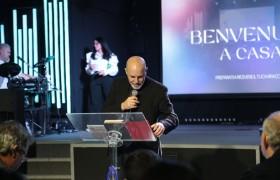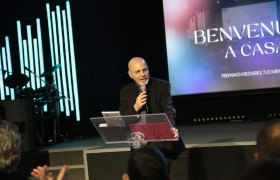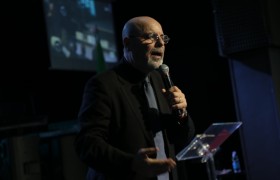History of Awakenings
PREACHING OF OCTOBER 13, 2024:
Pastor Luca Adamo
HISTORY OF AWAKENINGS
Pastor Luca Adamo, who visited us, began by saying that the topic he was about to address would turn out to be a journey through the history of God's revival, a story much broader than we could imagine, and that what we would see would also concern our personal lives. We have often looked at the great revivals of the past, perhaps thinking, "how fortunate they were", but what God did then can have an impact on us today. We talked about various revivals, such as the one in Bronson, the one in Almolonga, and others that occurred in the 1990s, extraordinary years for revival. While a revival was taking place in Bronson, during the same period there was also a movement in Toronto, in the northern United States, which lasted 12 years, although not with the intensity of Pensacola, which, although debated, was nonetheless a revival of souls. In the 1990s, another revival occurred in Richmond, led by a preacher nicknamed "the tattooed one", a controversial figure, criticized for his tattoos, some of which were done during the revival itself, but whom God still used; despite being interrupted by personal issues, the revival lasted about 7-8 months. The 1990s, until 2000, were marked by waves of revivals, as prophesied by Smith Wigglesworth, a preacher who lived around 1940 and died in 1948. He prophesied several revivals, including a healing movement that began in 1948 and lasted 11 years, during which great ministers performed extraordinary healings, characterized by its vastness and national impact. We have also seen revivals in the Catholic and charismatic world, especially in the 1970s, when the Holy Spirit entered the Catholic world. Another significant revival was that of teaching, which began in the 1970s, when people started bringing paper and pen to church to take notes and study the Bible, leading to a greater understanding of the Word. Smith Wigglesworth also prophesied a final great revival, characterized by an outpouring of the gifts of the Holy Spirit, where these gifts would manifest in the hands of individual believers. We have not yet seen this prophecy fully come to pass, but if it does, it is important to remember not to get prideful, as the gifts are not a reward for our goodness, but are given by the grace of God.
James 1:17; 17 Every good gift and every perfect gift is from above, and cometh down from the Father of lights, with whom is no variableness, neither shadow of turning.
We must remain humble, recognizing that if God uses us, it is by His grace and not by our merit. Even immature or capricious people can receive gifts of the Spirit, so it is essential not to attribute the credit for these gifts to ourselves, as they are gifts from God and not the result of our works or skills. It is important to remember that the gifts do not work like commercial promotions, where you get something in exchange for a purchase, but are, by nature, something we receive without any merit on our part. This is an important concept to keep in mind, especially if we should witness moments of anointing in our lives with the manifestation of the gifts of the Holy Spirit. If God gives us something, He does so for His glory and for our edification, and we must respond with gratitude and humility. We are living in an extraordinary moment in the history of revivals; for example, in February of last year, news came of a remarkable event at a university in Kentucky, a usually quiet and sparsely attended place, where a surprising revival was taking place. Initially, the university chapel was almost empty, with only 5 or 6 students regularly attending, but one evening, a man stepped up to the pulpit to pray and share a message on Romans 12, speaking of God's love in action. While preaching on the importance of serving God selflessly, the speaker noticed an increasing number of students entering; among them, 19 newcomers began to pray and praise God, filling the chapel with their voices, without music. Over time, more than 100 students joined this worship, and day and night, for 22 consecutive days, the chapel was flooded with a tangible divine presence. The news spread, drawing visitors from all over, curious to witness this extraordinary revival, and traffic greatly increased, with cars lined up for miles. People of all ages gathered, many sleeping in their cars to be close to that atmosphere of worship. During this time, other universities also began to experience similar revival movements. In fact, Lee University, located in the state of Tennessee, started holding continuous prayer meetings. However, even though they realized that God was working powerfully among them and despite the spiritual fervor and energy, the university's president, under pressure due to the disruptions caused by the movement, decided to bring the revival to a halt. He explained that it wasn't right for the revival to remain confined to that place and that it needed to continue elsewhere. Thus, in just a few days, this extraordinary event, which had changed the lives of many, came to an end. What happened teaches us that revivals can begin in surprising ways, but they can also end just as quickly. Yet we are called to keep our faith alive and ask the Lord to work among us as well, hoping that He will move to renew us in similar ways in our nation. We wonder why this story exists, considering that each of us faces our own challenges and problems in life; for this reason, we wish to offer a valuable insight to understand God's system and ignite a personal revival in our families, which is fundamental for their restoration. We are not saying that everyone must be revived, but we know that it is necessary for some family member to draw near to God, filled with the Holy Spirit. Jesus never distinguished between church members and disciples, for to Him, disciples and believers are the same thing, and He never asked who was practicing or non-practicing, because a disciple is a disciple. Everyone has their own timing and commitments, and there’s nothing wrong with that, but we are all called to be disciples. If there are no disciples in a family, a revival is needed, because revival can start even before reaching the church. We know that the Church involves many families and that their heads have authority over them, which enables much to be done to bring a wave of revival into their homes. Now, we want to share God's strategy to do this, and to do so, we tell the story of a king and his son, who has a friend, and there’s also a small boy in this story. Let’s think of the day of our birth and imagine the first words of welcome God spoke to us, asking ourselves what God might have said to Adam when he was created. The first words man heard from God were not "Let there be light", but something more personal. In Genesis 1:28, God says, "Be fruitful and multiply", these are the first words man heard from God, teaching us that God's anointing is present in every human being to bear fruit and succeed. You see, it took years to convince us that we are not capable, because we were told over and over again that we are not worth much and that we are the last in the class. But that's not true! God welcomed us saying, "Bear much fruit, you have God's anointing to succeed." And 4000 years later, Jesus, the Son of God, tells the disciples that the Father desires them to bear much fruit, expressing the same truth in John. When we encounter Jesus, our spirit awakens to the memory of God, from whom we come, and although sin separated us, knowing Christ makes us feel again the need for Him. God blessed Adam and Eve, while for Ishmael, Abraham's first son, we see what was reserved for him:
Genesis 17:20; 20 And as for Ishmael, I have heard thee: Behold, I have blessed him, and will make him fruitful, and will multiply him exceedingly; twelve princes shall he beget, and I will make him a great nation.
God's blessings extend to Ishmael; in fact, we observe how oil represents wealth for the Arabs, while for Israel, the true wealth is God. Even with Jacob, in Genesis 35:11, God says to him: "I am God Almighty, be fruitful and multiply." This reminds us that God desires us to bear fruit, and every time He speaks to us, He invites us to remember that we have the anointing to succeed in our endeavors.
John 15:8; 8 Herein is my Father glorified, that ye bear much fruit; so shall ye be my disciples.
This statement reminds us that God delights in us bearing much fruit, which doesn’t just mean bringing souls to Christ but also succeeding in all areas of our lives. Jesus, speaking in Hebrew, repeated what God said to man, and that’s why the disciples understood those words as direct communication from God. What God is telling us is that we are full of potential to accomplish it, and if things haven’t gone well so far, we must not give up because we can still make it! Even a single month can get us back on track after ten years, so let’s not give up, for there’s still time to change the outcome of our life with God in our hearts.
Galatians 3:29; 29 And if ye be Christ's, then are ye Abraham's seed, and heirs according to the promise.
This verse reassures us that, having Christ in us, Abraham becomes our grandfather because the genealogy of Jesus passes through Joseph, the husband of Mary, and Abraham represents our heritage. To better understand this heritage, we must consider a story dating back around 3,200 years concerning King Saul, described in Scripture as a handsome man and taller than others. The election of King Saul was not simple because God did not want Israel to have a visible king, but rather wanted it to be a nation governed by Him. However, the Israelites asked for a king like the other nations, and God, in response, chose Saul. Saul began his royal life with great humility, for one day, while searching for his uncle's lost donkeys, he encountered the prophet Samuel, the most respected man in Israel. Samuel anointed him with oil, prophesying that he would become king of Israel and told him to return home. When his uncle asked him what Samuel had said, Saul simply replied that the donkeys had been found, showing extraordinary humility by not boasting about his new status, remaining modest. Saul ruled Israel and had a son named Jonathan, a devoted and courageous young man. Jonathan, in turn, became friends with David, who at the beginning was just a shepherd who "smelled like a goat". David did not know how to speak or be around people, but through his friendship with Jonathan, he began to learn and develop his abilities. This reminds us that we can discover and develop the talents God has placed in us, despite the difficulties and challenges we face, and to do so, it is essential to free ourselves from the negative influences of the world so that divine gifts can emerge. By spending time in the king's house, David began to grow and flourish as a person, starting to make himself known, just as we can do in our own lives. King Saul is pleased because his son is keeping good company; in fact, David is the one who killed the giant, and for this, he becomes famous. But as time passes, David's talents draw more and more attention from the people, who begin to sing:
1°Samuel 18:7; 7 And the women answered one another as they played, and said, Saul hath slain his thousands, and David his ten thousands.
This provokes Saul's jealousy, as he begins to see David as a threat to his throne, showing that his downfall is not due to a lack of anointing, but a lack of character. This means that if we do not develop our character, even the anointing will not be enough to keep us steady. His jealousy grows, and Saul starts spreading negative rumors about David, labeling him as an evil man with bad intentions. He tries to persuade his son to consider David an enemy, but Jonathan, bound to David by a deep friendship and a covenant, firmly opposes his father. In fact, the two young men swore eternal friendship, committing to take care of each other and, in the event of death, to protect each other's families.
1°Samuel 18:3; 3 Then Jonathan and David made a covenant, because he loved him as his own soul.
When Saul accuses David of wanting to usurp his throne, Jonathan remains faithful to his friend, but the situation becomes more complicated because Saul continues to sow discord, feeding fear in the hearts of the people. Many begin to believe that David is evil, even though he never intended to harm either the king or his son. But one day, during a battle, Saul and Jonathan die, and the news of their death throws the court into panic. Fearing for the life of Mephibosheth, Jonathan's son, the nurse flees with him, but accidentally drops him, and he becomes crippled.
2°Samuel 4:4; 4 And Jonathan, Saul's son, had a son that was lame of his feet. He was five years old when the tidings came of Saul and Jonathan out of Jezreel, and his nurse took him up, and fled: and it came to pass, as she made haste to flee, that he fell, and became lame. And his name was Mephibosheth.
Once David became king, he was concerned about keeping his promise to Jonathan and asked if there was anyone left from Saul's house to whom he could show his kindness. He was informed about Mephibosheth, whom he promptly called. However, Mephibosheth feared for his life, convinced that David wanted to take revenge for the deaths of Saul and Jonathan, but David reassured him:
2°Samuel 9:7; 7 And David said unto him, Fear not: for I will surely shew thee kindness for Jonathan thy father's sake, and will restore thee all the land of Saul thy father; and thou shalt eat bread at my table continually.
David then restored Saul's lands to him and invited Mephibosheth to eat always at his table. Mephibosheth, in disbelief, could not believe the king's kindness, who kept his promise, thus demonstrating that true friendship and covenant transcend fear and distrust. We must keep in mind that Christianity is a luxurious version of the application of the old covenant because it includes all its blessings, along with additional gifts such as eternal life. If the old covenant promised the blessing of regaining one's possessions, this continues to apply to us. We can imagine David starting to list everything that should be restored to Mephibosheth, as if he were a notary announcing the return of property. However, Mephibosheth is there prostrate and does not understand what is happening, not realizing that grace and blessing do not depend on his worth but on his descent from Saul.
2°Samuel 9:8; 8 And he bowed himself, and said, What is thy servant, that thou shouldest look upon such a dead dog as I am?
When Mephibosheth asks him this question, David does not respond because, having not received permission to speak to the king, doing so would have forced him to punish him with death, making him understand that the blessing he received was unconditional. Then, David calls Ziba, the servant, and orders him to return to Mephibosheth everything that belonged to Saul, also entrusting him with the task of cultivating the land and gathering the harvest. This means that Mephibosheth, from a man in misery, suddenly becomes rich with a full team of workers, so while he remains prostrate on the ground, he receives wealth without having to do anything.
2°Samuel 9:11; 11 Then said Ziba unto the king, According to all that my lord the king hath commanded his servant, so shall thy servant do. As for Mephibosheth, said the king, he shall eat at my table, as one of the king's sons.
Even though Mephibosheth ate at David's table, he remained a cripple, symbolizing how it was not by his merit or abilities but purely by grace. This story shows us how an afflicted man can go from a state of misery to one of abundance in a short time, without any effort on his part. Today we must recognize that God desires to restore our dignity and the things that have been lost, just as He did for Mephibosheth. Even as we face challenges in life, God has a message for us: "Come out of the shack", because He wants to restore what belongs to us. Let us remember that, although our parents and grandparents are important, our inheritance in Christ Jesus holds greater value and offers us the opportunity to experience a personal awakening in our lives. The church is a place of promise, but the destiny of our lives depends on us, and today we can choose to believe that we can reclaim our inheritance in Christ Jesus.





























